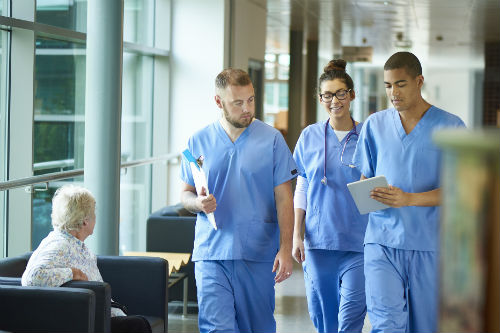Bristol will be one of the first medical schools in the country to do this.
A virtual qualification ceremony for the students will be held on Friday 3 April attended by the University’s Vice-Chancellor and President, Professor Hugh Brady.
Once provisionally registered by the General Medical Council (GMC) they will be invited to apply for jobs by the Foundation Programme, which will oversee the national implementation.
The Medical School anticipates that the majority of its new doctors will be working in local hospitals in Bristol, Bath, Swindon, Taunton, Gloucester, Yeovil, Cheltenham and Weston-super-Mare.
Depending on GMC registration, it is likely that they will be working in hospitals before the end of April.
They will predominantly be working on the wards in the hospitals clerking new patients, checking on admitted patients, assisting more senior doctors, ordering tests and checking results, prescribing drugs and undertaking procedures such as siting drips.
Bristol Medical School are providing practical and topical advice and information about starting as a doctor to the newly qualified cohort.
They will also support individuals personally, both through maintaining contacts with the year five academic team, and also with the Academy where the doctors trained. In addition, they will encourage community spirit by setting up social media groups based on where doctors begin practice.
Like all new doctors, they will be supervised and mentored by more experienced colleagues and Bristol Medical School will also continue to provide close support.
Ben Turner is one of the final year medical students who will qualify early this week. He said: "After a minimum of five years of study, final year medical students possess fundamental skills to support our NHS colleagues at this time of national crisis.
"The cohort feels an overwhelming desire to help and graduating us early is vital to support hospitals already feeling the strain, allow the reallocation of more senior doctors to the front line and create capacity in the system as medical staff increasingly need to self-isolate.
"It is important to remember that, whilst COVID-19 cases are rising amongst the inpatient population, other unwell patients continue to present to the health service. Ensuring the highest standard of care for all patients remains the number one priority of everyone within the NHS family; early graduation of final year nurses and medical students will reinforce the national fight against this virus."
John Gilbert, another final year medical student, added: "Myself and my fellow final year students want to help the NHS as much as we can. We have all spent five, or six years studying medicine to enter a career of serving the health of the UK.
"Many of us have already demonstrated to the Medical School and the General Medical Council all of the necessary requirements to graduate as doctors. During this time of international crisis, a health crisis, we want to start work a few months early so that we can help our colleagues, help our NHS, and help our country to overcome Covid-19.
"We are ready to work; we want to help out; and we are entering a well-supported and caring community of NHS professionals who will supervise us."
Megan Kelsey, who will also qualify this week, said: "Going straight into an NHS hospital at the moment might seem quite daunting however this is a job we’ve been training for five to six years and we’re all really eager to help out in this time of national crisis.
"Whilst this strain on the NHS is unprecedented, there's equally never been a more rewarding time to start our careers as doctors. At this time, it's very touching to see how the country is coming together to support the NHS and do their bit wherever they can and it only feels right that our skills and knowledge are put to good use where they’re most needed."
Professor Ashley Blom, Head of Bristol Medical School, said: "We have worked with our NHS partners throughout the region to ensure that our newest cohort of young doctors will be both effective and safe in their roles in the NHS during these challenging times.
"The University of Bristol will continue to provide support and care for our new doctors. We are confident that they are ready for the challenges ahead and will make a strong contribution."
Dr Andrew Blythe, Bristol Medical School Programme Director, added: "We are immensely proud of our final year class who have been magnificent. They are well trained, capable and their positive response to the crisis has been overwhelming. The staff and students have worked extremely hard to ensure that the students have completed all aspects of their training and are ready to work as junior doctors."
Professor Jane Norman, Dean of Health Sciences, said: "Medical Schools across the nation are working hard to ensure that their final year students are fully trained and ready for qualification.
"We will be one of, if not the first Medical School to qualify our students, but over the next few months many Medical Schools will do the same. With this additional workforce and all the dedicated retired staff who have recently returned to service, the NHS will be in a much stronger position to look after the nation."
Professor Hugh Brady, Vice-Chancellor and President, added: “I am incredibly proud of our final year medical students and look forward to taking part in Friday's virtual qualification ceremony.
"They will be an invaluable and welcome addition to our hardworking NHS medical teams during this very testing time. On behalf of the University of Bristol, I thank them for their service and wish them all the very best for the future."
